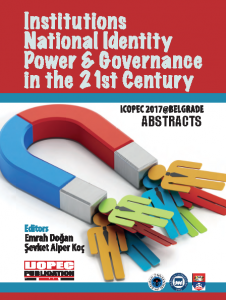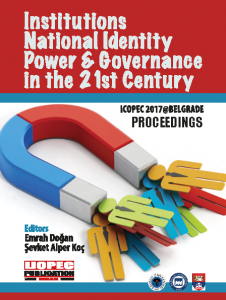ICOPEC 2017
CALL FOR PAPERS
“Institutions, National Identity, Power, and Governance in the 21st Century”
28-30 June 2017, Belgrade / Serbia
International Conference of Political Economy (ICOPEC) is organized by Batman University Faculty of Economics and Administrative Sciences, Marmara University Faculty of Economics and Faculty of Philology, University of Belgrade (Serbia) with the cooperation of University of Westminster (United Kingdom), Institute for Economic & Social Research of Piedmont (IRES, Italy), Ostrava Technical University (Czech Republic), Aligarh Muslim University (India) and Pontifica Catholic University of Lima (Peru).
The main theme of the 8th ICOPEC conference has been identified as “Institutions, National Identity, Power, and Governance in the 21st Century”. However, ICOPEC 2017 will also be open to different aspects of political economy’s subtopics and submissions in culture studies related to the conference theme mentioned below.
The 8th ICOPEC will be held in Belgrade on June 28-30, 2017. We invite proposals for oral and virtual paper presentations around the main themes of the conference. The best paper prize will be given for each of the disciplines of economics, politics, political economy, public administration, public finance, international relations, sociology, philosophy, cultural studies, language studies, business communication, labor economics, business management, and econometrics.
The languages of the conference will be ENGLISH, TURKISH, and SERBIAN. Abstracts and session proposals should be around 300 words, in Word format and 12 fonts, and include the paper title, the name(s) and full address (mail address, affiliated institution, e-mail, phone, and fax) of the author(s), the purpose and the method of the work, expected results and implications. Abstracts should be electronically submitted by May 20, 2017, via e-mail to bilgi@icopec.org or electronically submitted at http://www.icopec.org/icopec2017_3/submission-form/. Detailed information regarding the conference can be obtained at www.icopec.org and author guidelines can be obtained at www.icopec.org/author-guidelines.html.
All accepted full papers will be published by IJOPEC as an e-book with ISBN before the conference. In addition, selected papers will be published in 3 edited international books and peer-reviewed journals, such as International Journal of Productivity Management and Assessment Technologies, Journal of Life Economics, World Journal of Applied Economics, Marmara Üniversitesi İktisadi ve İdari Bilimler Fakültesi Dergisi, Çalışma ve Toplum, and KPY Yıllık Açık Alan after the conference.
About the Main Theme and Scope of the Conference
Economic development and the success of economic policy designed to accomplish developmental aims can be seen as a product of political interactions between citizens and rulers, and social interactions among the members of the society in broad terms. As structures or mechanisms of social order, institutions govern the behavior of a set of individuals within a given community. In the words of Douglass North (1990: 4), “Institutions are the rules of the game in a society, […] the humanly devised constraints that shape human interaction. […] They structure incentives in human exchange, whether political, social or economic.” North (2003) suggests that “institutions exist to reduce uncertainty in the world. In a world without institutions, we would not know how to deal with each other. Institutions are the incentive systems that structure human interaction. They can make our dealings with each other every day in all kinds of forms and shapes. They thereby not only reduce uncertainty in the world but allow us to get on with everyday business and solve problems effectively.” This conference takes the analysis of formal and informal institutions as a departure point, in the context of which to evaluate the varying and evolutionary performances of developmental states and their frequently top-down policies aimed at adjusting or altering “the rules of the game” for their developmental problem-solving—if in accord with their own respective national identities.
National identity, on the other hand, is one of the most basic social identities and it is the sine qua non of citizenship. The nation-state has often been more of a reflection of political aspiration than sociological reality. As Gianfranco Poggi has pointed out, the modern state is a “made historical reality,” a “purposively constructed, functionally specific machine” (1978: 95, 101), and as such it needs to mobilize commitment through a national ideology. In other words, the state as the political realm is continuously faced with the task of legitimizing itself to its citizens or the nation—the cultural sphere (Bechhofer & McCrone, 2009).
Traditionally, structures of decision-making implementation have been rigid, centralized, top-down, and predetermined in nature be they in families, firms, or governments. Over time, however, the traditional notions of sovereign authority have weakened to the point where in many circumstances universal principles, such as those of human rights and environmental sustainability, are becoming both more legitimate and more effective than rules imposed by appealing to national prerogatives. Similarly, the trend at the micro level of firms and families had been away from the unconstrained authority of the owner and father over employees and family members.
Individual and social aspirations changed markedly during the 20th century, and not only for people and institutions in the wealthier parts of the world. Globally, there has been until recently a steady if uneven, transition away from passive acceptance of divine rights to active pursuit of human rights, and away from unquestioning obedience to patriarchal authority to a more egalitarian recognition of individual liberty. Such shifts in values have played an important role in altering the ends and means of governance. In several parts of the world, including Western countries, however, a resurgence of right-wing nationalist parties criticizing human rights concepts and striving for the restoration of patriarchal gender roles has occurred especially over the last few years.
Despite today’s general tendency to assign formal power to citizens and shareholders, in practice the choice of goals and the means for reaching them remain largely delegated, centralized, and hierarchical. Nevertheless, it is desirable and even plausible to consider the longer-term prospects for a major transformation in the institutions, rules, and cultures that shape practical governance in all societies. For critiques of globalization, the concept of territoriality is crucial. They perceive the selective rehabilitation of borders as essential for alternative development concepts.
In line with general trends of prevailing global social discourses the importance of cultural elements is growing both in spheres of general social development and economic development. The importance of language, translation, and general understanding of different cultures is on the rise in a world that is increasingly multipolar and multicultural. Thus ICOPEC 2017 is providing a venue for presenting new research in areas of culture studies and language studies where they provide a good basis for a multidisciplinary approach to a better understanding of institutions, national identity, power, and governance in the 21st century. Various cultural elements are of special interest when researching economic development and if one is to accurately envision future social and economic trends good insight is also needed into the development of business communications, translation possibilities of humans and machines, and other implications arising from everyday interactions of various entities in a multicultural business and social environment.
Through mapping the processes and consequences of globalization, among other things, this conference seeks to look into the multiple strands of often conflictual and contradictory forces and trends of the world in the 21st century. The presentations are expected to cover, but not limited to, the following issues on www.icopec.org.


